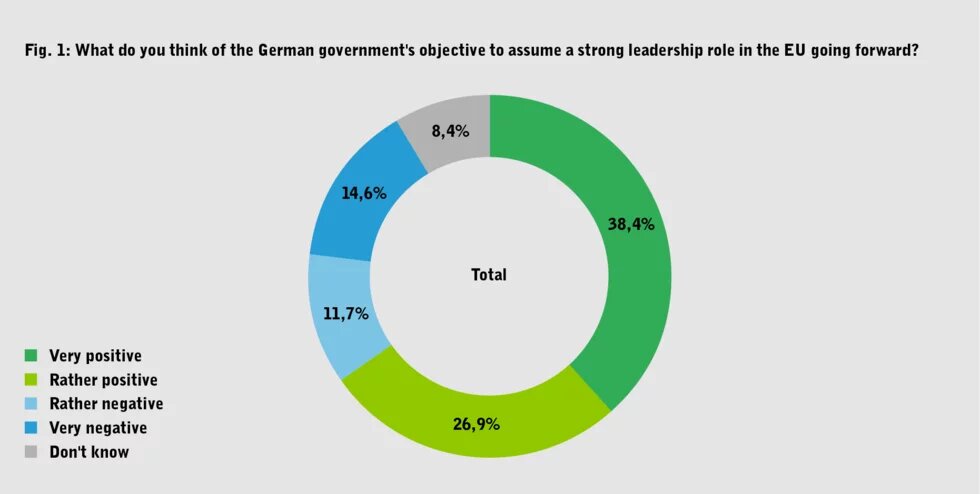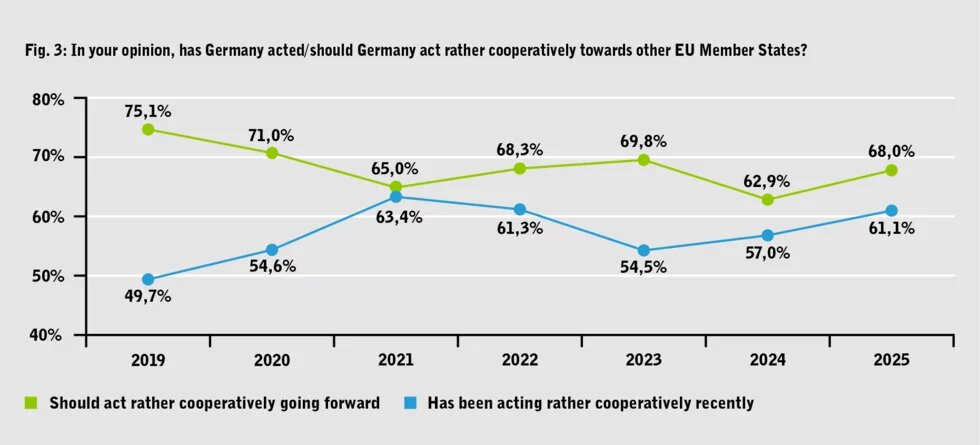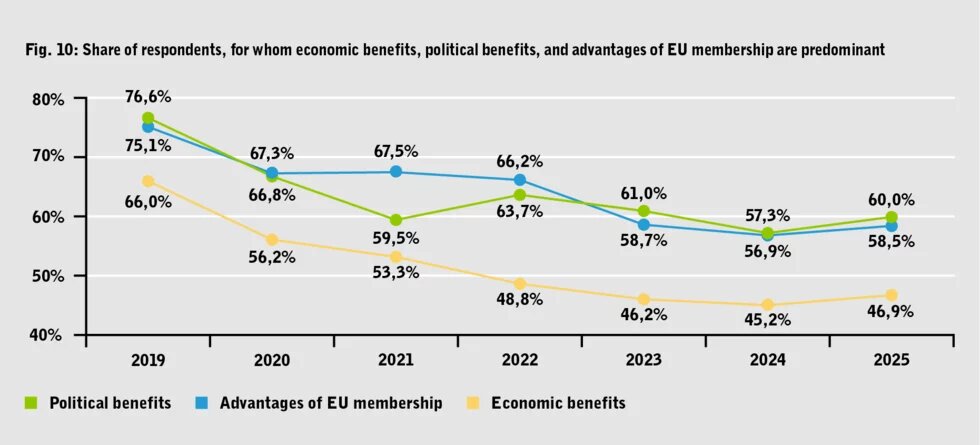
A majority of citizens in Germany have a positive view of the new federal government‘s pledge for a stronger leadership role in the EU, but clearly advocate for doing so in a cooperative manner. These findings come from the latest edition of our long-term study 'Actually European!?' on Germany’s role in the EU.

The EU is facing enormous challenges. The Russian war of aggression against Ukraine continues unabated. The U.S. administration has put their reliability in the transatlantic security architecture into question. In Europe, the political shift to the far-right is advancing. Economic transformation is becoming even more urgent. The climate crisis is accelerating. Liberal democracy and the idea of a united Europe are under tremendous pressure. In its coalition agreement, the new German federal government of CDU/CSU and SPD has formulated the ambition of taking on a stronger leadership role in the EU. In this context, the long-term study “Actually European!?” examines how citizens assess Germany‘s role in the EU and what kind of attitude they would like the German government to display in Brussels.
Key findings of the representative survey 1
- Support for a stronger German leadership role in the EU: The European thrust outlined in the coalition agreement enjoys broad support across society. Nearly two-thirds of citizens (65.3 percent) view a stronger leadership role for Germany in the EU as either rather positive (26.9 percent) or very positive (38.4 percent).

- Call for cooperative EU policy by the German government: In addition to endorsing a stronger German leadership role in the EU, a majority of respondents (68 percent) also call for a cooperative attitude from the German government in Brussels.

- Top priorities: Migration and integration, defence and competitiveness: From the public’s perspective, the three most important EU-policy priorities are: migration and integration (56.0 percent), security and defence (55.3 percent), and economic competitiveness (46.1 percent). Respondents are also in favour of increased joint investments in defence (52.1 percent), domestic security (45.5 percent), research, education, and innovation (36.8 percent), and the economy (35.5 percent).
- Support for a European defence union: More than half of respondents (56.5 percent) agree that European defence should primarily be a joint project. 20.8 percent are in favour of differentiated integration in this area – e.g., in armament policy. Support for a common European defence policy is relatively high in both West Germany (58.5 percent) and East Germany (48.7 percent).
- Declining support for European climate protection: According to respondents, other political measures currently take precedence over climate protection. This trend has intensified in recent years: in 2025, only 24.8 percent support more joint spending in this area – down from 42.2 percent in 2022.
- Advantages of EU membership prevail, but economic skepticism persists: A majority of respondents believe the advantages of EU membership outweigh the disadvantages (58.5 percent). However, a narrow relative majority feel that, economically, the costs (47.9 percent) outweigh the benefits (46.9 percent). Furthermore, 58.6 percent believe that Germany‘s financial contribution to the EU is too high.

Trends and policy recommendations
- Cooperatively shape Europe’s future: While a majority of citizens have a positive view of the new German government‘s leadership ambitions, they clearly advocate for doing so in a cooperative manner. The current German government should therefore pursue a leadership style in its EU policy that emphasises cooperation and refrain from bypassing EU law in pursuit of ostensibly quick solutions in the name of national interests.
- Communicate Europe‘s economic benefits: Most respondents recognise the political benefits of EU membership and prioritise defence, security, and economic competitiveness within German EU policy. A transparent debate about concrete European solutions can demonstrate that high expectations of the EU necessarily come with financial commitments. The federal government should clearly convey that the benefits of EU membership far outweigh Germany’s financial contributions.
- Do not neglect Europe‘s climate and social promises: Economic competitiveness and security are top priorities for respondents. Both cannot be achieved at the expense of climate and social policy. On the contrary: addressing the climate crisis is essential for economic competitiveness, security, and democratic resilience. The German government should therefore advocate in Brussels against rolling back the European Green Deal and in favour of security-related investments that also deliver positive social outcomes.
- Reinforce Europe‘s promise of stability: Faced with global uncertainty, the EU is perceived as a source of stability. Strong public support for EU membership and the call for European solutions indicate that Germany has the backing of its citizens to help shape an EU that responds to fundamental needs – beyond defence and economic growth. The new federal government should assume the financial responsibility required to ensure the EU is equipped to meet this challenge.
The summary of the study is available as a PDF here.